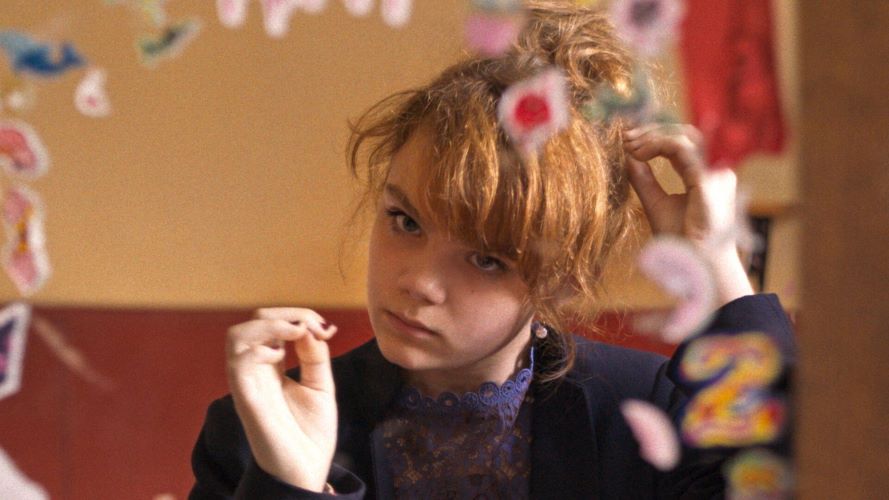
Emmanuelle Nicot’s striking debut feature, Love According to Dalva, is a sensitive exploration of the aftermath of incest, from the perspective of the survivor, 12-year-old Dalva. Nicot sets the tone by beginning her narratives where other narratives of incest might conclude. The film opens with an emotionally charged scene as Dalva (Zelda Samson), restrained by the police, screams and calls to Jacques, her father, who is being arrested. Taken into custody, events are depicted from Dalva’s perspective, the doctor’s face looming large as she explains to Dalva that her black, lace dress is part of the investigation. Dalva is now safe, she has been rescued from her abuser, but for Dalva, torn away from the only home she knows, the feeling is one of loss; her wide eyes reflect her pain and confusion.
Dalva’s journey is just beginning. Zelda Samson delivers an intelligent and moving performance that depicts the way this young girl’s understanding of the world and of her own identity has been shaped by an abusive parent, yet at the same time, imbues her with courage, initiative, and resilience. The strength of Nicot’s film is that although Dalva has suffered abuse, she is not a victim – she is a young girl determined to survive and prevail. At first, as she is brought to the Givet Shelter, a group home for youth at risk, all her energies are devoted to resistance. Getting ready for her first day at a new school, she carefully attends to her appearance, borrowing lipstick from one of the other girls. Yet it is in that encounter with her peers that the magnitude of her abusive father’s impact is made apparent. Although the counselor at Givet made sure that Dalva went to school in borrowed clothing rather than her own inappropriately fancy and revealing top, there is a vast difference between Dalva and her schoolmates. They look years younger than Dalva, and it’s not just the lipstick. There are so many things that one takes for granted as part of childhood – like playing with other children – that she has never experienced.
Dalva’s suffering and sense of isolation are palpable. Her life has set her apart from the cheerful, chattering kids in her class at school. Samia (Fanta Guirassy), her roommate at the group home, gives her a less than warm welcome, yet they share a common burden – both are marked by the stigma of their situation. Beneath the veneer of concern, the community is often as harsh with the victims of crime as with the perpetrators. Never letting them forget their difference from others or pressing for lurid details, the community at large can make it very difficult for the individual to move on. In her rough manner, streetwise Samia warns Dalva not to trust her classmates and never share anything personal, and Dalva must figure out for herself, whom to trust and when to beware.
Through Dalva’s interactions with Samia, at school and in the group home, the film reveals her process as she comes to realize how her knowledge of herself and the world has been limited and manipulated by her father. The film is strengthened by the strong and very natural performances of its young cast. Fanta Guirassy stands out as Samia, tough and knowing, with a kind heart beneath her protective, rough exterior. Yet just as crucial to the narrative is Charlie Drach as Lucille, the confident, popular girl in Dalva’s class, whose friendly chatter conceals more sinister motives. As Dalva makes her own choices – some very happily, wrong-headedly childlike – there are moments of exhilaration.
Love According to Dalva
France, Belgium 2022 | 83 minutes | French | English, Hebrew subtitles
Director: Emmanuelle Nicot; Screenplay: Emmanuelle Nicot; Cinematography: Caroline Guimbal; Editing: Suzana Pedro; Music: Frédéric Alvarez; Cast: Zelda Samson, Alexis Manenti, Fanta Guirassy
Link to Love According to Dalva on the Jerusalem Film Festival website





